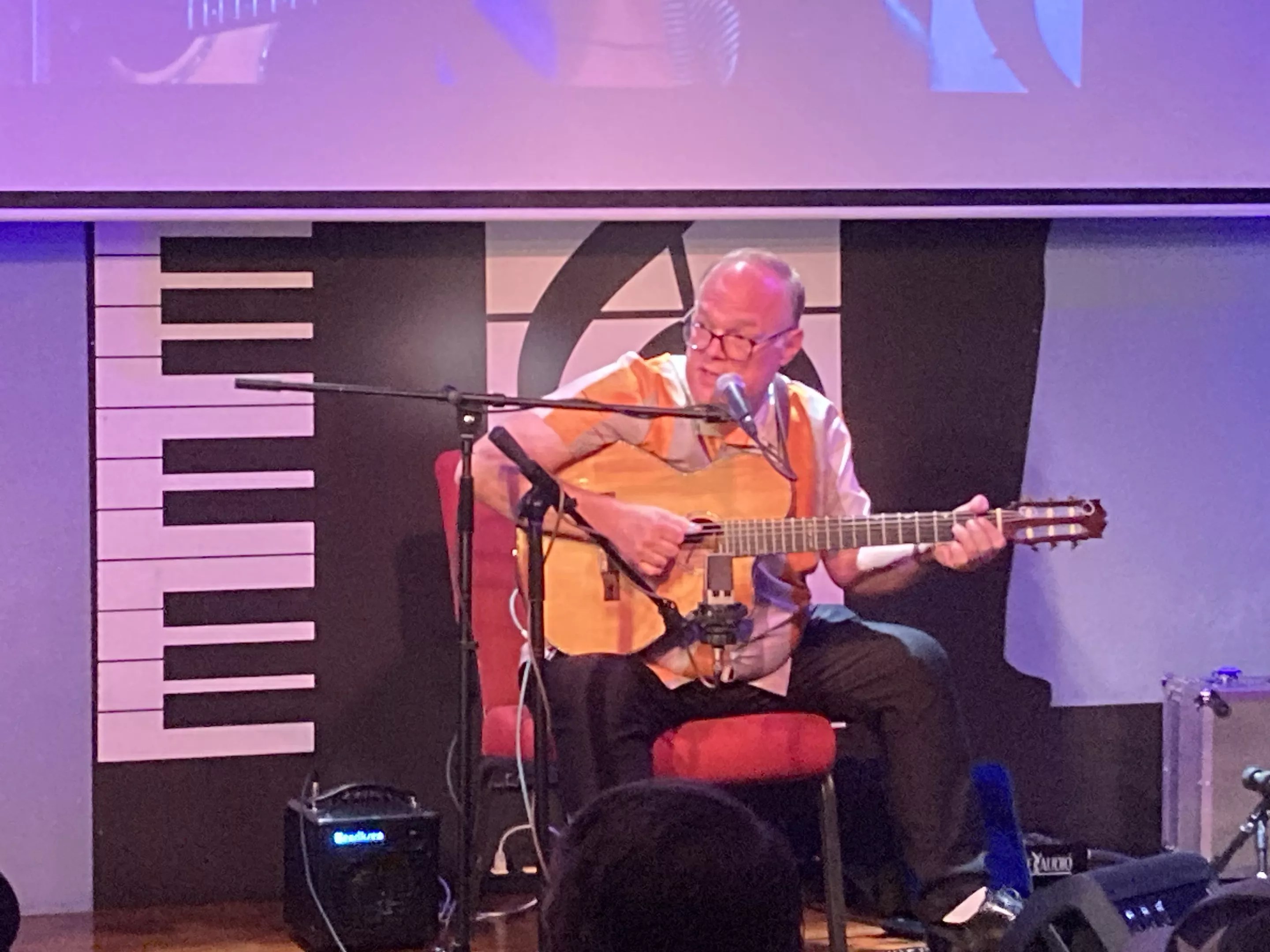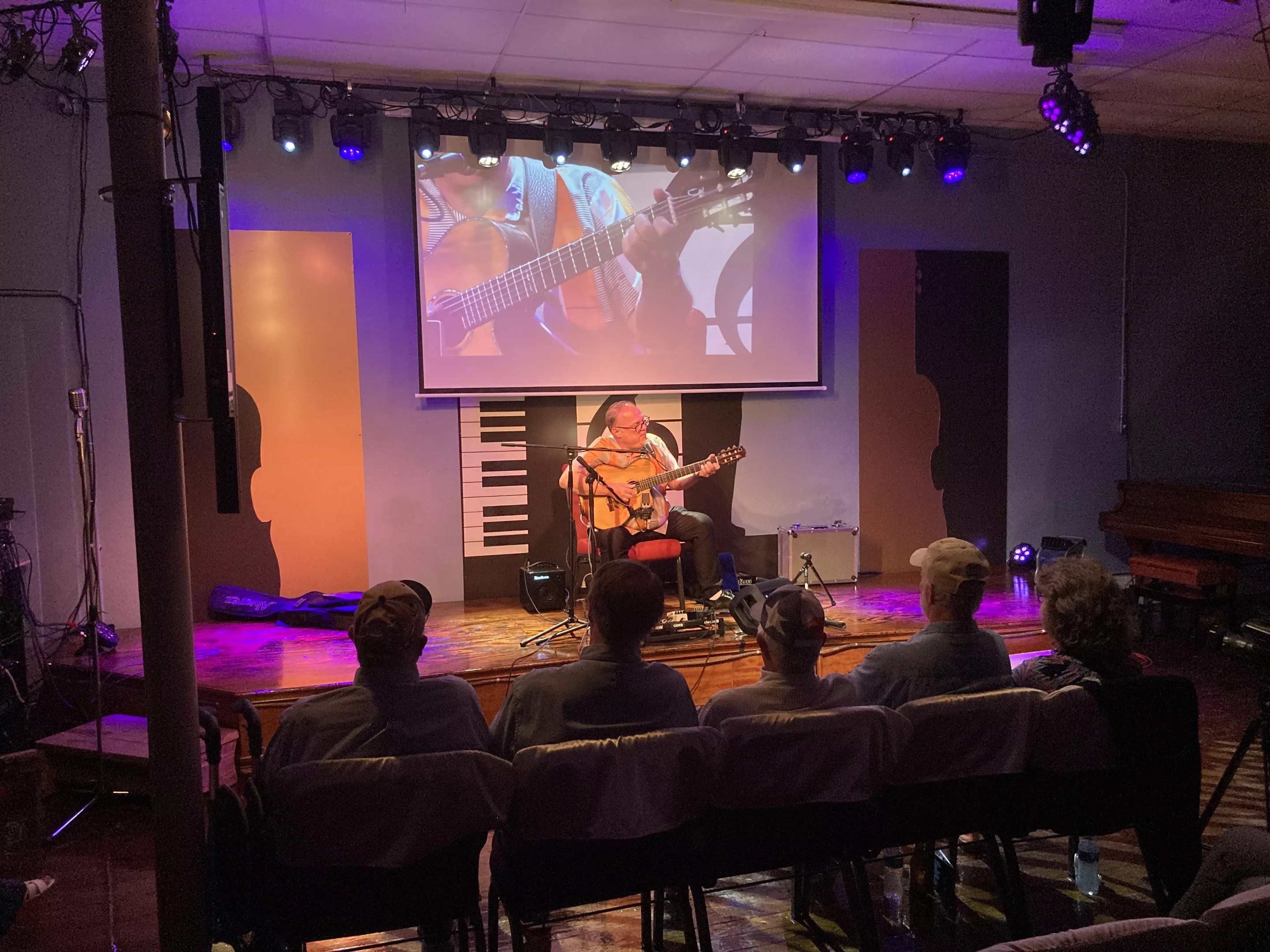
Courtesy of Richard Smith

Audio By Carbonatix
Richard Smith may be the best guitarist nobody’s ever heard of – but it’s probably best not to say so. If you did, you’d risk impassioned, if not actually violent, pushback from any guitar fan who prefers a different little-known virtuoso. But if you limit it to living acoustic fingerstylists, and you consider that thumb-picking legends including Chet Atkins, Jerry Reed and Tommy Emmanuel all have referred to Smith with terms like “hero” and “favorite,” then the argument that Richard Smith is one of the best unknown players on the planet deserves at least a hearing.
The crowd at Songbird Live got that hearing on Saturday, July 12, as Smith climbed onto the Cleburne listening room’s stage to display his world-class chops in a two-hour master class on thumb-picked six-string. Smith is a 53-year-old English-born Nashville resident who tours constantly, wheeling himself back and forth across America like a long-haul trucker.

Mark Henricks
“I drove from Lubbock today – not too bad,” Smith said in the southern English accent that has endured decades Stateside. “I go to Memphis tomorrow – too bad.” The good news, he says, is that after two months on the road, the 500-mile grind to Memphis is his last before a respite at home.
As part of his travels, Smith has played the Cleburne venue several times. A few of the 60 or so generally gray-headed attendees who’d paid $25 to $35 for seats indicated they’d seen him before. But for most people, a Smith concert is a revelation. He doesn’t play in front of many huge crowds, despite sharing high-profile stages with the likes of Atkins, Emmanuel and top-shelf jazz guitarist Frank Vignola. And even if you’ve heard him previously, the technical virtuosity and profound musicality he brings are at times almost overwhelming.
Smith, as he usually does, played only covers rather than drawing from his stock of original compositions. He likes to introduce songs by geography and era, mostly sticking to pre-1970s, while traveling across the globe. He kicked things off – literally, since while playing his left foot constantly stomps a driving rhythm – with Kyu Sakamoto’s “Sukiyaki.” This Japanese-language single reached No. 1 on the Billboard Hot 100 in 1963, the only song by an Asian artist to achieve that feat in the United States until K-pop’s arrival.
More than just a technical freak, Smith brings a jovial everyman personality to the stage that makes his performances well-rounded entertainment. Between-song banter often pairs music with history, quizzing listeners on trivia about the tune. A few at this show identified “Sukiyaki” accurately, picking out the familiar haunting melody among Smith’s intricate embellishments.
After that, he returned to England – still in the 1960s – with “Eleanor Rigby.” While the song was undeniably the Beatles’ hit, Smith lavished on it more trills, runs and substitutions than Sir Paul McCartney likely ever dreamed of. He seemed almost apologetic for the decoration, but explained, “When you’re playing a song like ‘Eleanor Rigby,’ where the melody is the same but the words are always changing, you have to do something.” More Beatles followed: “When I’m Sixty-Four” and “Here, There and Everywhere,” all stretched well beyond their original sonic envelopes.
Next, in one of several set pieces of stagecraft, Smith challenged listeners to identify artist, song and album as well as the TV show for which the next song was the theme. Whispers of “The Dating Game” cropped up soon after he outlined the familiar notes, and one or two called out “Herb Alpert and the Tijuana Brass!” But nobody got “Spanish Flea” as the song title or “Going Places” as the 1965 album.
Smith then returned to his first love – classic thumb picking- with a few from Jerry Reed. After “A Thing Called Love,” he shifted to drop D tuning for “Struttin’.” After Reed, he strolled to “Streets of Laredo,” first making sure everyone knew the haunting melody originated in Ireland. Another Texas connection was “Mr. Bojangles,” played like you’ve never heard it. Jerry Jeff’s strumming and even Nitty Gritty Dirt Band’s well-ornamented version sound like clanging garbage can lids compared to Smith’s mammoth expansion of the original harmonies and melodies.

Mark Henricks
A couple of songs later, he launched “Georgia on My Mind” in a fashion he often displays on standards. He’ll hint at the theme for a bar or two, then veer into alternate notes, inversions and rhythmic variations. After circling the motif for a while, he’ll finally reveal it more fully mid-song. The effect is like stalking a tune, building tension and pouncing to gratify listeners with a plain statement before expanding its harmonic horizons yet again.
The second set opened with a string of thumb-picking standards, followed by a Triple-A jazz rendition of George Gershwin’s “Embraceable You.” Then came guitar arrangements of Chopin, Joplin and stride piano pieces. After that wide-ranging selection, a Hawaiian slack-key song in open G tuning, followed by a fiddle tune, “Black Mountain Rag,” seemed almost to be expected.
One of Smith’s defining traits, clearly, is a vast openness to genres. It seems there’s almost nothing he can’t and won’t play. Even Fernando Sor’s “Introduction and Variations on a Theme by Mozart” – a signpost of virtuosity for classical guitar performers – poured out its cascade of notes without any sign of difficulty beyond, perhaps, a slightly reddened face and a tendency for his unfashionable glasses to slide down his nose.
Smith closed the concert with John Philip Sousa’s “Stars and Stripes Forever,” a rousing and remarkable thing to hear from a solo guitar. Later, he says he learned the tune, as is his usual practice, by listening to a recording.
“I’ve always been an ear player,” Smith says. “I know what the notes mean and I can write parts for my wife, who is a cello player, but I can’t sight read.”
After chatting about the travails of life on the road (unfortunately necessary), AI in music (possibly useful) and his “Richard Smith” signature model electrical-acoustic nylon-string guitar by late master luthier Kirk Sand (essential), Smith gathered up his merch and headed through gathering storm clouds for a Mount Pleasant motel en route to Tennessee. Back in Nashville, with wife and friends, he’d for sure be known. Whether he was one of the world’s best guitarists or not wouldn’t matter much.